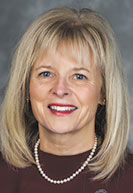Subscriber Benefit
As a subscriber you can listen to articles at work, in the car, or while you work out. Subscribe NowThe COVID-19 pandemic forced nearly all aspects of life to readjust to new standards of communication, productivity and work-life balance. With it, Americans in the workforce were expected to adjust their occupational duties to accommodate the differences.
But for many, these changes led to stress and burnout, causing some to leave a profession entirely.
The nursing profession in particular saw a significant drop in numbers in response to increased stress related to the pandemic.
The state of Indiana is one of many across the U.S. working to temper the shortage. Senate Bill 132, which makes it easier for nurses from other countries to obtain licenses to work in the state, went into effect on July 1.
Approximately 100,000 registered nurses left the workforce during the pandemic because of stress, burnout and retirement, according to data gathered by the National Council of State Boards of Nursing for its 2023 research project, “Examining the Impact of the COVID-19 Pandemic on Burnout & Stress Among U.S. Nurses.”
NCSBN is a not-for-profit organization that develops standards for nurses in the United States, including issuing the National Council Licensure Examination (NCLEX), the premier national exam for nursing licensure.
The data also found that more than 610,000 additional RNs reported an “intent to leave” the workforce by 2027.
62% of all respondents reported an increase in their workloads during the pandemic.
Simplifying the licensure process
SB 132 is considered the follow-up to earlier legislation designed to address the nursing shortage in the state, according to Blayne Miley, Director of Advocacy & Programs for the Indiana State Nurses Association.
 House Bill 1003, introduced during the 2022 legislative session and signed into law in March 2022, gave the Indiana State Board of Nursing authority to issue by endorsement licenses to practice for international nurses.
House Bill 1003, introduced during the 2022 legislative session and signed into law in March 2022, gave the Indiana State Board of Nursing authority to issue by endorsement licenses to practice for international nurses.
That law broadened the pathways for international nurses to gain licensure in Indiana, making the state one of few to have several approaches.
Previously, international nurses seeking approval for a license in Indiana had to successfully pass two prerequisite exams: the NCLEX and the Commission on Graduates of Foreign Nursing Schools Qualifying Exam (CGFNS).
The CGFNS is described as a “predictor” for passing the NCLEX and is therefore a duplicative requirement, according to the National Council of State Boards of Nursing.
It was created back when the NCLEX exam wasn’t accessible to nurses outside the U.S., Miley said. Though it’s since changed, the predictor test is still one pathway to utilize. All nurses still must pass the NCLEX to apply for licensure.
Though Senate Bill 132 has many subsections to it, its focus on the nursing profession addresses how to simplify the process for international nurses to obtain a license in the state.
“Because there is variability in how states handle the licensure process for internationally educated nurses, states that have a more efficient process are at a competitive advantage to states that have a less efficient process,” Miley said.

The updated language now states that applicants can meet the English proficiency to work in the state if they pass the NCLEX in English or pass the NCLEX in a different language as well as an English course from a nursing education program approved by the Indiana State Board of Nursing.
SB 132 does not alter the NCLEX itself, said Sen. Liz Brown (R-Fort Wayne), the author of the bill. The goal of the law is not to lower the threshold of professional ability but rather broaden the pool of candidates to choose from, Brown remarked.
“We’re not trying to reduce standards,” she said.
In addition, the bill broadens what vendors can perform a credential assessment for international nurses. Now, any organization approved by the board or is a member of the National Association of Credential Evaluation Services can make the assessment.
International nurses in the United States
According to KFF, a health policy organization, there were around 500,000 immigrant nurses in the United States as of 2022, compared to the nearly 3.2 million registered nurses in total.

The profession is particularly common in the Philippines, and because of the country’s economy, nursing students there often choose to come to the U.S. or go to other countries once they’ve earned their bachelor’s degree, said Matilde Upano, former president of the Philippine Nurses Association of Indiana.
The transition to the U.S. is particularly straightforward for nurses in the country.
“There’s an expectation that when you graduate, you go out of the country, you go to the U.S.,” she said. “Our education is patterned after the U.S., and so Filipino nurses are very much in demand.”
The Philippine Nurses Association played a large role in advocating for both SB 132 and HB 1003.
Coming to the U.S. as an international nurse can be challenging.
On top of getting a nursing license to work in the country, these nurses need the proper documentation to live here too.

“They have to balance both the licensure process as well as the immigration process,” Miley said. “One can’t advance until the other advances and that can create difficulties.”
But by implementing SB 132, international nurses now have more efficient ways of applying for a license, supporting themselves and the United States.
“It’s easier for these qualified professional nurses to come and work in Indiana, especially with the current shortage, where our legislators and everybody, the governor’s administration, they’re all willing to work the best to streamline the process in order to attract more qualified nursing professionals,” Upano said. •
Please enable JavaScript to view this content.

